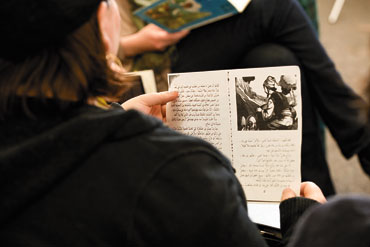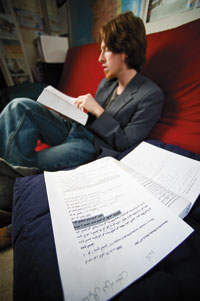Students embrace Arabic in new International Learning Community
Arabic script runs along the dormitory hall of the third floor in Adams Hall. To an outsider it looks like an intricate design flowing among the plaster, but to the residents it provides direction and introductions to their fellow floormates.

Cristina Treviño-Murphy reads from a selection of Arabic text during professor Dustin Cowell’s class session as part of the International Learning Community (ILC) Arabic floor study program in Adams Hall.
Photo: Bryce Richter
This is Baytunaa, the Arabic floor in the International Learning Community (ILC). Baytunaa, meaning “our home,” houses five undergraduate students dedicated to speaking Arabic and learning about the different Arabic-speaking countries and cultures.
Baytunaa really does feel like a cozy little home. Students receive special Arabic instruction outside of their daily classes while sitting in overstuffed comfy chairs in front of the fireplace.
Sadam Issa, a Jordan native is the language floor coordinator.
“I have students of all levels learning and practicing standard Arabic, the Arabic used in modern journalism, legal systems and other formalities in Arabic-speaking countries,” says Issa. “It’s the language people use when speaking to someone of another Arabic dialect.”
Residents of Baytunaa meet with Issa three times a week to watch movies, play games and converse in Arabic. These meetings enhance speaking and writing skills while providing cultural knowledge of the Arabic world. This is all part of a one-credit Integrated Liberal Studies course all ILC students are required to take. It provides heightened cross-cultural understanding.
“ILC is one of the many ways in which UW–Madison prepares its students for an increasingly interdependent world,” says Gilles Bousquet, dean of the Division of International Studies. “It’s global competence training at its best.”
“I feel motivated to speak and learn more Arabic living here in Baytunaa,” says Cristina Treviño-Murphy, a freshman resident studying sociology. “It’s so much easier to find the resources to practice Spanish or French, but not Arabic. I have so many resources for practicing that are almost impossible for people to find. I can speak Arabic with people living on my floor and get help from a native speaker — Sadam.”

Student Michael Goldstein studies in his residence hall room in Adams Hall. The Arabic floor program focuses on teaching students the Arabic language through an immersive learning environment that includes not only Arabic-based classes, but also a living environment designed to surround the students with Arabic in their everyday lives.
Photo: Bryce Richter
Baytunaa residents and all other ILC residents have the greatest resource of all — a fluent speaker in their language of study living on their floor.
“I have students in my room all the time asking questions about Jordan or wanting help with their homework,” says Issa. “They’re good students, they want to be here, and they want to learn.”
Baytunaa not only provides the necessary and hard-to-find resources for students, but it also prepares them for their futures.
“My experience here learning Arabic and living in Baytunaa has provided and continues to provide me with so many different perspectives,” says sophomore Michael Goldstein. “In order to learn and speak Arabic you have to apply a whole new way of thinking, it’s incredibly challenging, but very rewarding.”
The residents of ILC have a unique opportunity to live in a cross-cultured environment. Every floor has its own language and identity specific to those countries where the language is spoken.
“The ILC is a place where people speak five to six different languages and have been to so many different places, all of these details and backgrounds create for an amazing environment that you can’t get anywhere else,” says Treviño-Murphy.
All ILC residents are encouraged to share their views and ideas with one another at bimonthly roundtable dinners, creating a little global community of knowledge and insight.
Tags: diversity, housing, international, learning, student life




